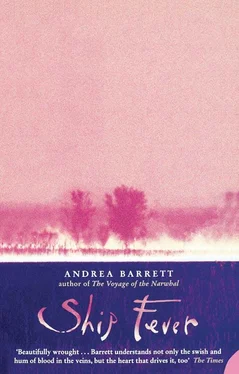Am I such a troublemaker?
John said, “In the staff meetings, you ask quite a few questions. Sometimes you want to know why you can’t be reassigned here or there, why you can’t try this or that, why they can’t get better food for the patients, why the servants don’t behave better — this isn’t a situation where questions are welcomed. And then this place”—he waved his hand around my makeshift office and sleeping quarters, touching two of the walls as he did so—“What do you think it looks like, you unwilling to sleep at Mrs. Caldwell’s with the rest of us? You hardly talk at dinner, you bolt your food and run back here…some of the staff say you think you’re better than the rest of us.”
Me — who worries all the time that I’m not holding up my end. Then he brought up Nora and her work with the patients. I have given her too much responsibility, he says. I talk with her too freely.
“It’s a question of maintaining our positions here,” he said. “Where would we be if the emigrants started questioning the authority of the administration? Tens of thousands of them. And on our side a few hundred of us, an old fort, a handful of guns, a small detachment of troops — not much to keep them from ignoring us altogether and continuing upriver in any fashion they want.”
Suddenly I could not like him so much anymore. “You see this as a war?” I asked sharply. “These poor sick people as our enemies?”
“I see that we have a responsibility to our own citizens.”
We parted stiffly and I wonder if we will share our precious leisure time again. Now he will be against me as well — but I too have sometimes seen this not as a war against fever but as a war against the emigrants who carry it. Doesn’t it come down to the same thing, the way we’re forced to run this island? Susannah was right: hidden in myself was the capacity to view the poor as the enemy.
June 29, 1847. I saw four dogs yesterday, slinking along the streets; there can no longer be any doubt of what goes on in the burial ground. The graves are not sufficiently deep; the coffins are laid one above the other, with no more than a foot of earth to cover them. Although we do not speak of it among ourselves, we are all aware of the army of rats come ashore from the fever ships and swarming through the trenches. Six men are now employed full time, digging fresh graves and reburying those disturbed.
Another letter from Arthur Adam, dated April 14th. The usual woe to report, with one bit of good news: the U.S. sloop-of-war Jamestown, loaded with food contributed by charitable Americans, landed in Cork earlier that week. He reports that every inch below the gun decks, including water tanks, storehouses, and the ward room, was filled with provisions. The food vanished into the gathered crowd like water spilled on dry ground; yet it was something, he says. Very much something, and more help than those people get from Parliament.
This day the husband of a woman recently deceased on a brig from Limerick set off to bury her in a small boat granted him for that purpose by the brig’s captain. Two sailors attended him and rowed. As they were unable to find the burial ground, they dug a grave among the trees at that tip of the island which is cut off from the rest at high tide. In this act they were discovered, and forced to leave. Rowing back to the brig, they came upon the usual line of boats making their grim journey to the burial ground and, joining this line, finally arrived at the right place. The grave was dug without incident, but after it was filled the grieving husband seized one of the shovels and struck the nearest sailor a blow with it. The sailor remains unconscious and we fear for his life. The husband disappeared into the woods and has not been found.
July 3, 1847. Too busy to attend to this, although every night I mean to. Prisoners from the city jail arrived two days ago, to act as gravediggers, carters, and attendants. More than 2,500 sick now on the island; more physicians have arrived but two have fled in disgust and nine are themselves sick. Father O’Reilly, who visits the tents at the eastern end of the island where the “healthy” are quarantined, claims that he has in two weeks given last rites to fifty who were dying. When I return I mean to go with him, if there are by then any other medical officers well enough to cover here. Dr. Malhiot is pale and weak but swears it is only exhaustion.
Tomorrow I go to Quebec, at Dr. Douglas’s request: he cannot spare me, he says, he cannot spare anyone, but someone must go on this errand and he claims that I am “persuasive” and thus will be of much use. We need food, medicine, tents, bedding, everything; he begs me to report in person to members of the Board of Health and press our case. Secretly I wonder if by “persuasive” Dr. Douglas does not mean “pushing” or “argumentative” or both. But I am trying to follow John Jameson’s advice and accept my orders without question.
I hope to see Susannah. And Arthur Adam as well, who must surely have returned home by now.
I carry also a message from Nora, which she begs me to run as an advertisement in both the Mercury and the Montreal Transcript:
“Information wanted of Ned Kynd, aged 12 years, and Denis Kynd, aged 17 years, from county Clare, Ireland, who arrived in Quebec or Montreal about five weeks ago, aboard the steamer Queen —their sister having been detained at Grosse Isle. Any information respecting them will be thankfully received at this office.” [IV.]
Lauchlin was so tired on his second journey aboard the St. George that the landscape passed before him in a kaleidoscopic blur. He dozed and woke and dozed again, each time opening his eyes to sights that no longer seemed familiar. Cape Tourmente and Mount St. Anne, then the orchards and vineyards of Orléans Island, and Montmorency Falls tumbling white and foamy between the firs — how was it these places could look so untouched?
The steamer arrived at the mouth of the St. Charles in the middle of the afternoon. Canoes and pilot boats bustled around the large ships anchored in the harbor. Men streamed along the wharves and timber ponds, carrying out the work by which Lauchlin’s father had made his fortune. Before his mother’s death, before his father grew so fierce and distant, Lauchlin had often accompanied him here. Then, as now, a fleet of bateaux with great white sails had carried lumber from Findlay Grant’s sawmill at Montmorency Falls to the ships lined up along the coves.
Amazing, how the roar and bustle of riverside commerce continued in the midst of this crisis. The confusion in the yards and wharves had alternately bored and frightened Lauchlin when he was a boy, and he’d found the London Coffee House, where his father liked to gossip with the Ottawa lumbermen and ship captains, hot and squalid. His father’s disappointment with him had been evident here, as elsewhere. That he did not like to hunt plover and partridge in the Bijou swamp, that he did not much care to shoot caribou near Cape Tourmente, or join the snowshoe races across the ice in winter — all these things had widened the rift between them.
But this summer Findlay Grant was doing business out west, alone but for his crews among the pines and basswoods and maples, and of no more use to Lauchlin than he had ever been. Lauchlin turned his back on the forest of masts and made his way through the Lower Town and then up to the city crowning the cliff. The long sets of stairs swarmed with people. A woman hurrying down cracked his elbow with a basket and one of the hens inside opened her beak so wide in protest that Lauchlin could see down her gullet. The woman pressed on, leaving Lauchlin with a painful bruise.
Читать дальше
Конец ознакомительного отрывка
Купить книгу












